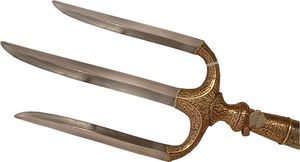Trident
| ) | |
|---|---|
| Name | trident |
| Appearance | trident |
| Damage vs. small | 1d6+1 |
| Damage vs. large | 3d4 |
| To-hit bonus | +0 |
| Weapon skill | trident |
| Size | one-handed |
| Base price | 5 zm (+10/positive enchant) |
| Weight | 25 |
| Material | iron |
A trident is a kind of weapon that appears in NetHack. It has a special +4 to-hit bonus against swimming monsters that are in water, and a secondary +2 to-hit bonus against any S snake or ; sea monster that are not in water.[1]
If you eat a trident while while polymorphed into a metallivore, you get YAFM and exercise wisdom.[2]
Contents
Generation
Tridents are one of the rarer weapons in the game, making up only about 0.8% of all randomly generated weapons.
The following monsters have a unique chance of being spawned with a trident in their monster starting inventory:
- Salamanders: 2⁄21, or about 9.5%.[3]
- Horned devil: 3⁄4, or 75%.[4]
Trident skill
| Trident | |
|---|---|
| Max | Role |
| Basic | |
| Skilled | |
Tridents are the only weapon to use the trident skill. There are no artifact tridents.
Strategy
Tridents are significant as a popular choice for the secondary weapon in twoweaponing. A trident averages 7.5 damage versus large monsters, one point more than a katana, making it the most damaging one-handed non-artifact weapon versus large monsters. Along with silver sabers, crysknives, and katanas, tridents are one of the best choices for twoweaponing.
Average damage calculation
The average damage calculations in the following table do not include bonuses from weapon skills, strength, or from using a blessed weapon against undead or demons.
| Weapon | Small monsters | Large monsters |
|---|---|---|
| +0 trident | 
|

|
| +7 trident | 
|

|
History
Tridents were present in the first public release of Hack, Hack 1.0.3.
Origin
Tridents have origins dating back to ancient Greece and Rome, and have been used for both fishing and combat historically and in modern times; the trident is also the divine instrument of the Greek god Poseidon, as indicated by the encyclopedia entry. Both these facts also explain the to-hit bonus against sea monsters and swimmers. The word "trident" originates from the Latin tridentis which literally means "three teeth", referring to the tines; tridents designed primarily for fishing usually have barbed tines, which may be the basis for the 3 dice used to calculate damage versus large monsters.
In warfare, tridents were favored for their long reach and ability to disarm and dismount horse-riding combatants. The trident also sees use often in heraldry and military emblems. In Dungeons & Dragons, tridents deal 1d8 base damage versus opponents, but have a lower critical hit multiplier than the the similar 1d8 long spear. This results in lower average damage, but they are one-handed, allowing for use a shield or an off-hand weapon.
Messages
- That was pure chewing satisfaction!
- You ate a trident while in the form of a metallivore.
- Four out of five dentists agree.
- As above, while hallucinating.
Encyclopedia entry
Poseido(o)n, lord of the seas and father of rivers and
fountains, was the son of Chronos and Rhea, brother of Zeus,
Hades, Hera, Hestia and Demeter. His rank of ruler of the
waves he received by lot at the Council Meeting of the Gods,
at which Zeus took the upper world for himself and gave
dominion over the lower world to Hades.
Poseidon is associated in many ways with horses and thus is
the god of horses. He taught men how to ride and manage the
animal he invented and is looked upon as the originator and
guardian deity of horse races.
His symbol is the familiar trident or three-pronged spear
with which he can split rocks, cause or quell storms, and
shake the earth, a power which makes him the god of
earthquakes as well. Physically, he is shown as a strong and
powerful ruler, every inch a king.
by Herbert Robinson and Knox Wilson ]
References
This page may need to be updated for the current version of NetHack.
It may contain text specific to NetHack 3.6.0. Information on this page may be out of date.
Editors: After reviewing this page and making necessary edits, please change the {{nethack-360}} tag to the current version's tag or {{noversion}} as appropriate.

